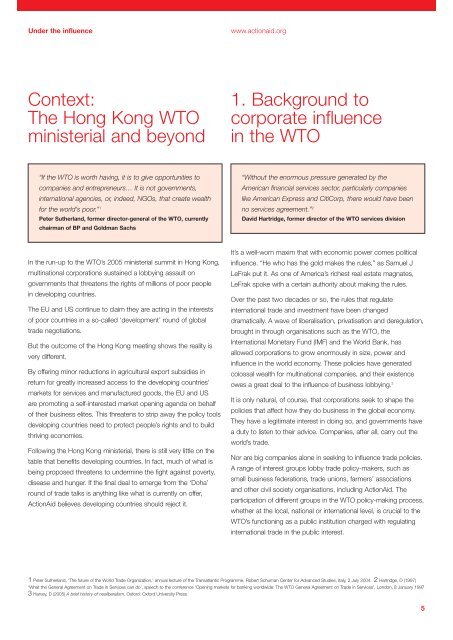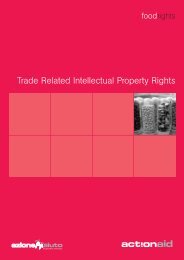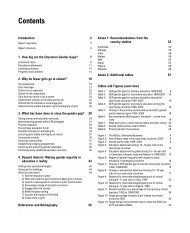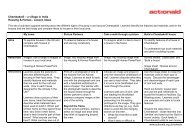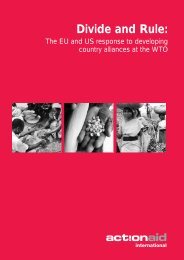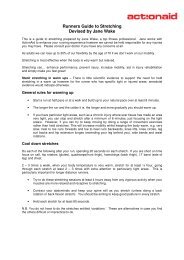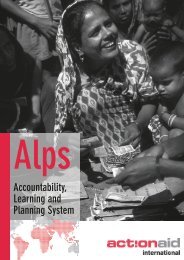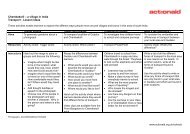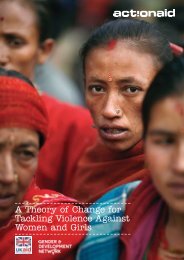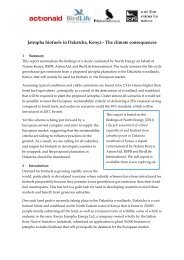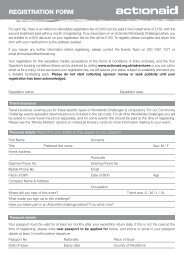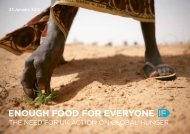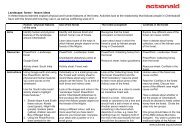UNDER THE INFLUENCE - ActionAid
UNDER THE INFLUENCE - ActionAid
UNDER THE INFLUENCE - ActionAid
Create successful ePaper yourself
Turn your PDF publications into a flip-book with our unique Google optimized e-Paper software.
Under the influence<br />
www.actionaid.org<br />
Context:<br />
The Hong Kong WTO<br />
ministerial and beyond<br />
1. Background to<br />
corporate influence<br />
in the WTO<br />
“If the WTO is worth having, it is to give opportunities to<br />
companies and entrepreneurs… It is not governments,<br />
international agencies, or, indeed, NGOs, that create wealth<br />
for the world’s poor.” 1<br />
Peter Sutherland, former director-general of the WTO, currently<br />
chairman of BP and Goldman Sachs<br />
“Without the enormous pressure generated by the<br />
American financial services sector, particularly companies<br />
like American Express and CitiCorp, there would have been<br />
no services agreement.” 2<br />
David Hartridge, former director of the WTO services division<br />
In the run-up to the WTO’s 2005 ministerial summit in Hong Kong,<br />
multinational corporations sustained a lobbying assault on<br />
governments that threatens the rights of millions of poor people<br />
in developing countries.<br />
The EU and US continue to claim they are acting in the interests<br />
of poor countries in a so-called ‘development’ round of global<br />
trade negotiations.<br />
But the outcome of the Hong Kong meeting shows the reality is<br />
very different.<br />
By offering minor reductions in agricultural export subsidies in<br />
return for greatly increased access to the developing countries’<br />
markets for services and manufactured goods, the EU and US<br />
are promoting a self-interested market opening agenda on behalf<br />
of their business elites. This threatens to strip away the policy tools<br />
developing countries need to protect people’s rights and to build<br />
thriving economies.<br />
Following the Hong Kong ministerial, there is still very little on the<br />
table that benefits developing countries. In fact, much of what is<br />
being proposed threatens to undermine the fight against poverty,<br />
disease and hunger. If the final deal to emerge from the ‘Doha’<br />
round of trade talks is anything like what is currently on offer,<br />
<strong>ActionAid</strong> believes developing countries should reject it.<br />
It’s a well-worn maxim that with economic power comes political<br />
influence. “He who has the gold makes the rules,” as Samuel J<br />
LeFrak put it. As one of America’s richest real estate magnates,<br />
LeFrak spoke with a certain authority about making the rules.<br />
Over the past two decades or so, the rules that regulate<br />
international trade and investment have been changed<br />
dramatically. A wave of liberalisation, privatisation and deregulation,<br />
brought in through organisations such as the WTO, the<br />
International Monetary Fund (IMF) and the World Bank, has<br />
allowed corporations to grow enormously in size, power and<br />
influence in the world economy. These policies have generated<br />
colossal wealth for multinational companies, and their existence<br />
owes a great deal to the influence of business lobbying. 3<br />
It is only natural, of course, that corporations seek to shape the<br />
policies that affect how they do business in the global economy.<br />
They have a legitimate interest in doing so, and governments have<br />
a duty to listen to their advice. Companies, after all, carry out the<br />
world’s trade.<br />
Nor are big companies alone in seeking to influence trade policies.<br />
A range of interest groups lobby trade policy-makers, such as<br />
small business federations, trade unions, farmers’ associations<br />
and other civil society organisations, including <strong>ActionAid</strong>. The<br />
participation of different groups in the WTO policy-making process,<br />
whether at the local, national or international level, is crucial to the<br />
WTO’s functioning as a public institution charged with regulating<br />
international trade in the public interest.<br />
1 Peter Sutherland, ‘The future of the World Trade Organization,’ annual lecture of the Transatlantic Programme, Robert Schuman Center for Advanced Studies, Italy, 2 July 2004. 2 Hartridge, D (1997)<br />
‘What the General Agreement on Trade in Services can do’, speech to the conference 'Opening markets for banking worldwide: The WTO General Agreement on Trade in Services', London, 8 January 1997<br />
3 Harvey, D (2005) A brief history of neoliberalism, Oxford: Oxford University Press<br />
5


